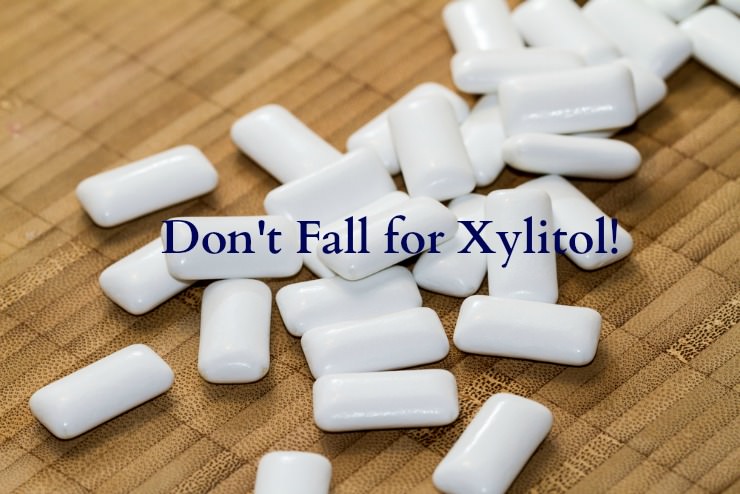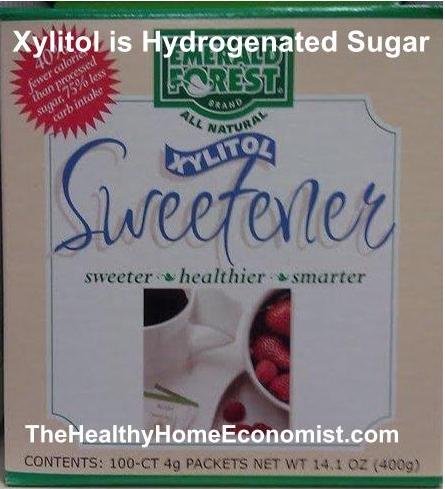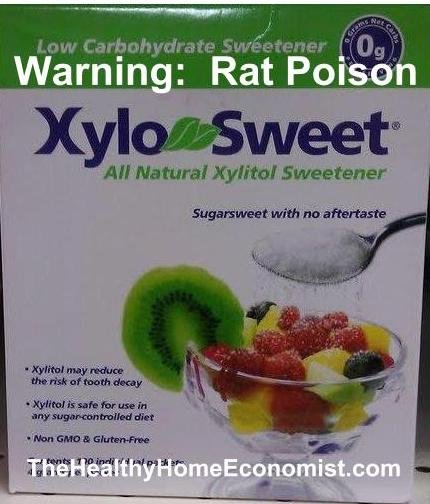
Xylitol is truly the darling of sugar substitutes today. The American Dietetic Association touts its use, with this sugar alcohol sold alone and as a sweetener in a variety of processed foods. Health benefits include a reduced glycemic response compared with sucrose, increased absorption of B vitamins and calcium, and even a reduction in dental caries risk.
Consequently, people with blood sugar issues are flocking to processed foods containing this alternative sweetener as a way to satisfy that sweet tooth without the downside of exacerbating the risk factors for Metabolic Syndrome. This condition is known for the markedly increased likelihood of developing heart disease, stroke, and type 2 diabetes.
Even the healthfood community almost universally considers this sugar alcohol to be a healthy substitute for sugar. A primary reason is that it doesn’t directly contribute toward the growth of intestinal yeasts aka Candida.
Have you noticed that the check out aisles at health food stores are typically loaded with chocolates and other sweets containing at least some xylitol? The truth is that I have yet to talk with any health-conscious person who suggests to me any downside other than the potential for intestinal cramps if you get too much.
Xylitol is Naturally Found in Nature
Xylitol is, after all, a naturally occurring substance. Manufacturers of xylitol market it as derived from xylan. The fibers of many plants contain it, including berries, oats, beets, sugar cane and birch. Sounds pretty harmless at first glance.
The FDA has even granted xylitol GRAS (Generally Recognized As Safe) status. You can’t get any safer than that, right?
 Manufacturing Process
Manufacturing Process
It is true that xylitol is a naturally occurring substance. However, manufactured xylitol is another matter entirely. Food manufacturers produce it using the industrialized process of sugar hydrogenation. In order to hydrogenate anything, a catalyst is needed. In this case, Raney nickel is used which is a powdered nickel-aluminum alloy. (1, 2)
This poses the risk of heavy metal residue and contamination. Nickel, by the way, is a recognized carcinogen and aluminum is associated with the development of dementia. Heavy metals in the body are notoriously difficult to eliminate with frequent use of infrared sauna probably a good idea.
This alternative sweetener doesn’t seem quite so warm and fuzzy anymore, does it?
There is currently no literature on any detrimental health effects of consuming hydrogenated sugar. However, food manufacturers widely used hydrogenated fats for decades before the very damaging effects of cardiovascular health became widely known!
Given the violent industrialized process that is required to produce a hydrogenated sugar like xylitol, it would seem wise to avoid it based on the very poor track record of hydrogenated foods in general.
Most Xylitol Sourced from GMO Corn
While it is true that xylitol can be derived from the xylan of birch trees, xylan is also found in corn cobs. It is much cheaper to use corn instead of birch bark to derive xylitol and so what do you think manufacturers prefer? Corn, of course.
Therefore, unless the label of a xylitol-containing product specifically notes that it is from birch or another nonGMO source, xylitol is very likely from genetically modified corn or possibly GMO sugar beets.
This is the same problem as high fructose corn syrup (HFCS) and white sugar from beets. Food manufacturers rely heavily on these sweeteners in the production of sodas and sports drinks.
You get a dose of GMOs with every sip! More on GMO dangers including sterility and stomach holes at the provided link.
Usage Contributes to Gut Imbalance
The digestive process does not break down sugar alcohols like food. Rather, xylitol arrives intact into the intestines.
At that point, a process called “passive diffusion” takes place. This means that the xylitol draws water into the bowels. Only a partial breakdown is the end result. The unmetabolized portion ferments providing the perfect environment for undesirable bacteria to thrive and grow.
It is true that xylitol itself does not feed candida directly as sugar does. As a result, this artificial sweetener is even promoted as a useful part of the Candida Diet. Unfortunately, the fermentation of undigested xylitol in the gut most definitely can exacerbate yeast problems. Don’t be fooled by this argument!
This is exactly why consuming xylitol can make some folks so gassy and even trigger cramping and diarrhea. Gut pathogens having a heyday in your intestines give off a lot of smelly toxins!
Other Little Known Problems
Xylitol can contribute to acid reflux problems. As a result, those who have issues in this area should avoid it for that reason alone. Chronic acid reflux is a serious problem that can lead to cancer of the esophagus and larynx.
In addition, those who suffer from seizures of any kind should stay away from this alternative sweetener as it can increase the frequency of epileptic attacks.
Two Pieces of Xylitol Gum Can Kill a Rat?
According to unpublished lab tests, approximately 1.65 grams of xylitol kills a 100-gram rat half the time.
Two little pieces of xylitol gum contain about .7 – 1 gram. This is probably enough to meet the definition of rat poison.

Cavity Prevention
Many people are chewing xylitol gum due to compelling scientific evidence for cavity prevention. What about children, however?
Rami Nagel, author of Cure Tooth Decay, doesn’t even recommend xylitol gum for this purpose. His research for any long term safety data turned up the following:
- Epidemiology: No information found
- Teratogenicity: No information found
- Reproductive Effects: No information found
- Mutagenicity: No information found
- Neurotoxicity: No information found
In summary, using this modern substance officially renders you a guinea pig, my friend! It seems that any benefits of cavity prevention are outweighed by the fact that there is no actual safety data backing up its use.
Safe Uses of Xylitol
Given all the problems that consumption of xylitol can trigger, it seems best to bypass the use of this sugar substitute on a regular basis.
Can it ever be helpful? Does it have any benefits whatsoever?
Potentially so. The only time I personally would ever consider using xylitol is to help resolve a childhood ear or sinus infection in order to prevent the use of drug-based antibiotics.
There is evidence that this popular sugar alcohol can indeed help encourage a healthy balance of beneficial bacteria found in the ear canal and sinus cavities. Products like this incorporate xylitol for this purpose.
A therapeutic dose can help resolve infection in these areas quickly with no medication required.
Thus, if you choose to use it, make sure it is sparingly and therapeutically (not as food). Also, make sure it does not come from a GMO source like corn!
References
(1) Xylitol production via catalytic hydrogenation of sugarcane
(2) Catalytic hydrogenation of xylose to xylitol using ruthenium catalyst on NiO modified TiO2 support
(3) Cure Tooth Decay by Rami Nagel
(4) Sugar-Free Blues: Everything You Wanted to Know about Artificial Sweeteners
More Information
Yacon: Healthy Syrup or Healthfood Hype?
Jaggery: India’s Sweet Gift








There have been tons o studies done on it. Here’s one source, and a summary of benefits:
http://www.iprogressivemed.com/misc/xylitol_a_sweet_alternative.pdf
Summary of Benefits
Xylitol is a sweet-tasting sugar substitute that has been approved for use in more than 35 countries. Consumption of xylitol is associated with a significant reduction in tooth decay, resulting in fewer cavities and resolution of periodontal disease. Xylitol has been shown to contribute to increased bone density, weight loss, stabilization of blood sugar and lowering of insulin levels. Additional benefits include:
– Increases energy by enhancing ATP production
– Increases utilization of fat
– Replenishes glycogen
– Anabolic – keeps biosynthetic pathways open
– Anticatabolic –helps maintain lean muscle mass
– Antioxidant –generates NADPH, keeping glutathione in an active state
– Increases endurance
– Reduces free radical and oxidative damage
think this really is scary stuff and there should be some studies done on it. I used it in my coffee the past two days. I know this may be TMI, but it is scary and I think people should know… Day 1, about 2 hours after drinking had intense diarrhea. Didn’t bother me though as I usually have the opposite problem, so I thought, wow this is great stuff! Day 2, a few hours after drinking, have somewhat regular bm. Hmm I think, okay I guess you get used to it. About 4 hours later have serious bleeding from rectum. I am not one to have ever had any issues like this what so ever.
this is the most unscientific scare-mongering drivel i’ve seen on the internet today … and i’ve been looking around some god awful health sites. oh em gee … it’s hydrogenated and that sounds a bit like hydrogenated fats. i thought the “sounds a bit like” argument went out in the middle ages except for geniuses like sarah palin
I was wondering where you get your information. I didn’t find any references to studies or other reasons for your comments. Any help this way?
Please don’t sell my email.
Everything in moderation is the key, and no sweeteners should be consumed in large quantities on a daily basis. In my opinion, xilitol derived from north american birch bark trees is much healthier than refined sugar.
You seem to be the only person who seems to be cautious even amoung natural health communities. I have tried xylitol and after a two weeks gave it up because of serious side effects, the least of them being intestinal, others were mental fog, headaches, insomnia and emotional changes. I only have two to three teaspoons in two coffees a day. I made sure the brand I got came from hardwood trees from North America. I have had some serious health problems in the past so this may be why it’s effects of me were stronger. I can’t believe other people are not complaining. I feel it had an effect on my liver or intestinal tract plus brain chemistry. I never use sweetener substitutes and just gave this a try because I don’t like using sugar….. Well never again. For all the evil they say about sugar, I find it to be the least harmful also the lesser of two evils.
“My other reason for being sceptical about Xylitol is that when we experience a sweet taste without any sugar, our bodies don’t quite know whats going on and sets off a cascade of reactions that are very much not helpful or healthy for diet or body. Me stays away from it.”
Of course, you are free to do what you wish. But your statement about the effects of xylitol is not founded on anything factual.
Anyway, as a longtime user of xylitol, I can attest that it has only contributed to my current superior state of health. If that sounds ad-like, so be it!
It rather IS factual, missy. Make your own mind up… but after reading articles like This –> http://empoweredsustenance.com/is-stevia-bad-for-you/ and the texts they link to, I don’t do artificial sweeteners even if they come from a natural source!
Glad to hear you are healthy, despite sounding like you would really like us folks to use Xylitol 🙂 Have a nice day!
Brilliant comment 🙂
I cleared up my eczema using xylitol, it lift my daily moods, helped me sleep better. My eczema was classed as fungal, I started taking xylitol as it was recommended for yeast overgrowths and my stubborn eczema patch moved from oneside of the body to the other and just disappeared 🙂 ,. If you’ve just started taking xylitol your body will need a few days to adjust, take half a tsp day 1, then 1 tsp day 2 and so on, after a week you’ll be fine..
Thank you, Jan for the research and information! And thank you a little bit also to the debaters/nay sayers as well. This sort of debate will lead to us getting the right picture. Though I must admit that responses like “Use Xylitol. It really is as sweet as it’s cracked up to be” seem rather worrying and ad-like!!!
Basically, I *won’t* be buying Xylitol, as a just in case measure, for a few reasons. I will stick with only rare treats made with ordinary sugar or honey (organic/ethical if possible) for me and the kids. 🙂
My other reason for being sceptical about Xylitol is that when we experience a sweet taste without any sugar, our bodies don’t quite know whats going on and sets off a cascade of reactions that are very much not helpful or healthy for diet or body. Me stays away from it.
I meant, Thank you Sarah. *foot in mouth* I had just read Jan’s comment and Jenifer’s reply to it.
Well said, Simon.
More grist for the xylitol mill – here is a comment on an anti-xylitol article at Natural News:
http://www.naturalnews.com/022986_xylitol_health_sugar.html
with all due respect to Mr Nagel regarding many of his very helpful dental ideas, this article ignores the LARGE body of research and evidence that supports all kinds of Xylitol benefits –
we used Weston PRice guidelines AND xylitol to STOP COLD our 1.5 year olds tooth decay and have used xylitol extensively for 4 years with nothing but good results.
Mr Nagel – xylitol is not a SUGAR it is a SUGAR ALCOHOL and if you have any chemistry knowledge whatsoever, you know there are two VERY DIFFERENT SUBSTANCES – and act chemically different in almost every way. That it is “processed” (the terror buzzword of natural food age) is to paint ALL processing of ANY substance with the same “it’s damned” brush and that is – in a word – ignorant. (and BTW – chocolate is deadly to dogs – care to extrapolate that one to humans and see how wrong you are??)
At Daiasolgaia (just google it) you will find a pletheora of positive study references to the use and research on xylitol as well as our story about how xylitol was an integral part of our dental health program. (no i don’t sell the stuff….)
Ravi Wells
Daiasolgaia